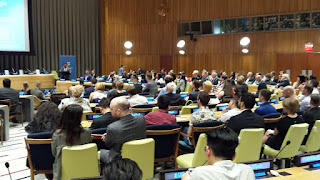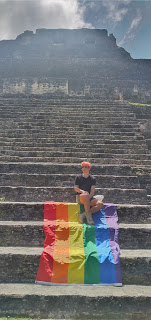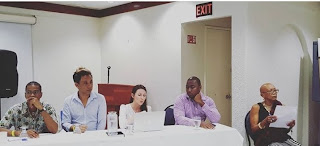SCALES OF JUSTICE: Philadelphia
Reposted July, 26th, 2013
SCALES OF JUSTICE: Philadelphia
by anthony sylvestre:
Written May 25th, 2013
In the most powerful country on earth, there is a city called Philadelphia. It is in the state of Pennsylvania, one of the original thirteen states of the United States.
Philadelphia is a city renowned for the statute of Ben Franklin, the Liberty Bell and Independence Hall (not the one here on Queen Street).
Its motto is “Let brotherly love endure.” It is also known as the “birthplace of America” as during the American Revolution, it served as an instrumental role as a meeting place for the Founding Fathers of the USA; and it was there that the Declaration of Independence was signed.
The city then, is regaled for its historic contours of liberty, freedom, and emancipation of the USA from Britain. It is therefore metaphorically referred to as the “cradle of liberty”.
Twenty years ago there was the release of a sensational movie called (you guessed it!) “Philadelphia”. The movie starred Tom Hanks and Denzel Washington. Hanks played the role of a prominent attorney who is homosexual. He also contracted HIV which later developed into AIDS. On the day Hanks is assigned the law firm’s biggest client, one of his bosses noticed a lesion on his forehead and he is told to look into it.
Hanks stays at home a few days to try to conceal the legion and works at home. He completes the work on the case just in time for it to be filed with the court on the last day and sends it to the office. But the documents are misplaced at the office and Hanks in the meantime suffers from bowel spasm at home and is rushed to the hospital. There, he receives multiple calls from his office about this important case for the law firm. In the end the documents are found in time to be filed with the court. The law firm, a couple days later, fires Hanks. They give the reason for his dismissal as incompetence, but Hanks knows that it is because of his sexual orientation and the fact that his illness was now becoming visible.
Hanks decides to sue his former employers for discrimination but no lawyer wants to take his case: a combination of homophobia and reluctance to take on the big law firm that Hanks previously worked with. Denzel, at first as well, refuses to take Hanks’ case as he himself is homophobic. But, he eventually takes the case for Hanks and in the end is able to establish in court that Hanks was dismissed because of suspicion of his sexual orientation and because of his illness.
Some weeks back, the issues of homosexuality, privacy, religion and discrimination came to a head the Supreme Court of Belize. And unless you have been living under a rock, you certainly would have been abreast of the constitutional challenge of my primary school and high school colleague Caleb Orozco. Indeed, over half the population of Belize (over 220,000 people) weighed in on the topic on channel5’s internet poll.
With this case, it seems to me that Belize is being pursued as the English Speaking Caribbean “Philadelphia” of the third millennium; that is to say, a place which is the symbol of liberty and freedom; the trendsetter, well at least in relation to the issue of sexual orientation.
Indeed, the case has been conceded to be a test case- a case which, if successful, will be a precedent to be used in the other territories.
Lord Goldsmith, former Attorney General of the United Kingdom under Tony Blair and one of the eminent attorneys who shouldered Caleb Orozco’s case, explained it this way:
“In all cases, we trace questions like this. It will be looked at in different parts of the world, to study and to see what the experience in Belize is and to draw from the decision of what the judge will make.”
Outspoken church goers have expressed the motive behind the case as being more sinister.
They claim that the case is being used to push a “gay” agenda throughout the Caribbean. They say that Caleb and UNIBAM are asking the wrong arm of government to implement their agenda. It is the legislators they should lobby, they say, not the courts, for no constitutional right of Caleb is being infringed by Belize’s sodomy laws.
Louis Wade, one of the more strident critics of Caleb and UNIBAM expressed it this way:
“As you continue to listen to the case – I’m going to ask the media and the representatives who have been allowed into the court room to ask yourself the simple question based upon the arguments that the attorneys are giving. Whether or not this situation should be in the court or it should be in parliament?
But those of us who went to primary school and high school with Caleb can attest to the incessant taunting, teasing, bullying and ridiculing that he was subjected to. Indeed such treatment is demeaning and dehumanizing and is inconsistent with the values of our democratic society and a person’s basic human rights.
But I see the point of Louis Wade and others of like mind- this intolerance that persists against those of homosexual proclivities do not stem from Belize’s sodomy laws. It stems from people’s belief systems. So, they question whether the court should be used as the catalyst to create the change in the norm sought by UNIBAM.
Court cases which serve as precedent inevitably are catalyst for changes in societal norms. Famous cases like the United States Supreme court case Brown v Board of Education are precedent setting cases which are catalysts for change in societal norms at the time. In the case of Brown, the United States Supreme Court held that state laws establishing separate public schools for blacks and white (racial segregation) was unconstitutional. The system in place at the time in fact perpetuated racial discrimination- the schools for blacks were inferior to those of whites.
In my view, the case brought by Caleb Orozco seeks to achieve this result; that is, act as a catalyst to change societal norms regarding sexuality in Belize. Whilst my personal opinions differ from that of Caleb and UNIBAM on the constitutionality of Belize’s sodomy law, I am an advocate for his right to bring the matter to court.
Justice is not reserved for the majority. For as a famous judge said, “[it] is not a cloistered virtue: she must be allowed to suffer the scrutiny and respectful … comments of ordinary men.”
It will be interesting to see where the scales of justice fall and what the judge rules in this case and whether Belize indeed becomes the Philadelphia of the Caribbean in the third millennium.
http://www.belizetimes.bz/2013/05/25/scales-of-justice-philadelphia/
SCALES OF JUSTICE: Philadelphia
by anthony sylvestre:
Written May 25th, 2013
In the most powerful country on earth, there is a city called Philadelphia. It is in the state of Pennsylvania, one of the original thirteen states of the United States.
Philadelphia is a city renowned for the statute of Ben Franklin, the Liberty Bell and Independence Hall (not the one here on Queen Street).
Its motto is “Let brotherly love endure.” It is also known as the “birthplace of America” as during the American Revolution, it served as an instrumental role as a meeting place for the Founding Fathers of the USA; and it was there that the Declaration of Independence was signed.
The city then, is regaled for its historic contours of liberty, freedom, and emancipation of the USA from Britain. It is therefore metaphorically referred to as the “cradle of liberty”.
Twenty years ago there was the release of a sensational movie called (you guessed it!) “Philadelphia”. The movie starred Tom Hanks and Denzel Washington. Hanks played the role of a prominent attorney who is homosexual. He also contracted HIV which later developed into AIDS. On the day Hanks is assigned the law firm’s biggest client, one of his bosses noticed a lesion on his forehead and he is told to look into it.
Hanks stays at home a few days to try to conceal the legion and works at home. He completes the work on the case just in time for it to be filed with the court on the last day and sends it to the office. But the documents are misplaced at the office and Hanks in the meantime suffers from bowel spasm at home and is rushed to the hospital. There, he receives multiple calls from his office about this important case for the law firm. In the end the documents are found in time to be filed with the court. The law firm, a couple days later, fires Hanks. They give the reason for his dismissal as incompetence, but Hanks knows that it is because of his sexual orientation and the fact that his illness was now becoming visible.
Hanks decides to sue his former employers for discrimination but no lawyer wants to take his case: a combination of homophobia and reluctance to take on the big law firm that Hanks previously worked with. Denzel, at first as well, refuses to take Hanks’ case as he himself is homophobic. But, he eventually takes the case for Hanks and in the end is able to establish in court that Hanks was dismissed because of suspicion of his sexual orientation and because of his illness.
Some weeks back, the issues of homosexuality, privacy, religion and discrimination came to a head the Supreme Court of Belize. And unless you have been living under a rock, you certainly would have been abreast of the constitutional challenge of my primary school and high school colleague Caleb Orozco. Indeed, over half the population of Belize (over 220,000 people) weighed in on the topic on channel5’s internet poll.
With this case, it seems to me that Belize is being pursued as the English Speaking Caribbean “Philadelphia” of the third millennium; that is to say, a place which is the symbol of liberty and freedom; the trendsetter, well at least in relation to the issue of sexual orientation.
Indeed, the case has been conceded to be a test case- a case which, if successful, will be a precedent to be used in the other territories.
Lord Goldsmith, former Attorney General of the United Kingdom under Tony Blair and one of the eminent attorneys who shouldered Caleb Orozco’s case, explained it this way:
“In all cases, we trace questions like this. It will be looked at in different parts of the world, to study and to see what the experience in Belize is and to draw from the decision of what the judge will make.”
Outspoken church goers have expressed the motive behind the case as being more sinister.
They claim that the case is being used to push a “gay” agenda throughout the Caribbean. They say that Caleb and UNIBAM are asking the wrong arm of government to implement their agenda. It is the legislators they should lobby, they say, not the courts, for no constitutional right of Caleb is being infringed by Belize’s sodomy laws.
Louis Wade, one of the more strident critics of Caleb and UNIBAM expressed it this way:
“As you continue to listen to the case – I’m going to ask the media and the representatives who have been allowed into the court room to ask yourself the simple question based upon the arguments that the attorneys are giving. Whether or not this situation should be in the court or it should be in parliament?
But those of us who went to primary school and high school with Caleb can attest to the incessant taunting, teasing, bullying and ridiculing that he was subjected to. Indeed such treatment is demeaning and dehumanizing and is inconsistent with the values of our democratic society and a person’s basic human rights.
But I see the point of Louis Wade and others of like mind- this intolerance that persists against those of homosexual proclivities do not stem from Belize’s sodomy laws. It stems from people’s belief systems. So, they question whether the court should be used as the catalyst to create the change in the norm sought by UNIBAM.
Court cases which serve as precedent inevitably are catalyst for changes in societal norms. Famous cases like the United States Supreme court case Brown v Board of Education are precedent setting cases which are catalysts for change in societal norms at the time. In the case of Brown, the United States Supreme Court held that state laws establishing separate public schools for blacks and white (racial segregation) was unconstitutional. The system in place at the time in fact perpetuated racial discrimination- the schools for blacks were inferior to those of whites.
In my view, the case brought by Caleb Orozco seeks to achieve this result; that is, act as a catalyst to change societal norms regarding sexuality in Belize. Whilst my personal opinions differ from that of Caleb and UNIBAM on the constitutionality of Belize’s sodomy law, I am an advocate for his right to bring the matter to court.
Justice is not reserved for the majority. For as a famous judge said, “[it] is not a cloistered virtue: she must be allowed to suffer the scrutiny and respectful … comments of ordinary men.”
It will be interesting to see where the scales of justice fall and what the judge rules in this case and whether Belize indeed becomes the Philadelphia of the Caribbean in the third millennium.
http://www.belizetimes.bz/2013/05/25/scales-of-justice-philadelphia/










Comments
Post a Comment